赫尔辛基国际机场
Helsinki Airport
赫尔辛基国际机场是芬兰的主要机场,也是北欧领先的长途机场。该机场每年可接待约2000万名旅客,多次被国际航空运输协会(IATA)评为世界最佳或规模最大的机场之一。 最近,该机场又在2020 SKYTRAX世界机场大奖中被提名为北欧最佳机场。
Helsinki Airport is Finland’s main airport and Northern Europe’s leading long-haul airport. Serving some 20 million passengers a year, the airport has repeatedly been ranked by the International Air Transport Association (IATA) as best in the world or among the top airports in its size category. Most recently, the airport was nominated Best Airport in Northern Europe in its size in the 2020 SKYTRAX World Airport Awards.
赫尔辛基国际机场是芬兰的主要机场,也是北欧领先的长途机场。该机场每年可接待约2000万名旅客,多次被国际航空运输协会(IATA)评为世界最佳或规模最大的机场之一。 最近,该机场又在2020 SKYTRAX世界机场大奖中被提名为北欧最佳机场。
PES参与赫尔辛基国际机场扩建项目已有几十年了,该项目是事务所迄今为止最大的项目。 这项工作首先是在1987年对新的欧洲航站楼进行了初步研究,然后在1996年完成了新的塔台、候机区以及商业和酒店设施,并在1999年完成了新的T2国际航站楼。
至1999年以来, PES又在机场完成了许多小的升级和扩建项目。例如:从2015年到2021年,为了适应欧洲和亚洲(主要是中国)之间日益增长的空中交通需求,赫尔辛基作为这一重要的过境枢纽为此开展了大规模的扩建工作, 占地约75,000平方米的扩建建筑将无缝连接到现有的非申根航站楼,PES又承接了这一扩建任务。
此外,事务所还设计了圆形的P3停车场以及环线铁路上的机场和Aviapolis地下火车站,该环线将机场连接到赫尔辛基市中心。
PES还负责机场的整个室内设计,包括设计各种定制的家具和机场固定装置,例如座椅,门柜和照明设备。与客户一起开发了寻路和标牌,以帮助平稳、安全地导航旅客。
T2国际航站楼扩建
随着1995年芬兰加入欧盟国家的航空运输,满足日益增长的空中交通需求,T2国际航站楼于1999年进行了扩建。
中央二号航站楼是赋予赫尔辛基国际机场独特美感的重要部分。它坐落在两条跑道交汇处的楔形场地中,这样的场地条件转化为建筑的形式语言引导着建筑形体的生成与优化,同时作为贯彻这个建筑的图形语言的三角形,在室内设计中的铺装纹理及吊顶图案和控制塔上也得到了应用。
在整个内部空间和塔台的平面图中,重复了由现场决定的三角形几何形状。 它也反映在细节上,例如三角形的花岗岩地板图案和悬浮的天花板。
三角形的出口大厅覆盖有支撑在三列上的稍微弯曲的三角形空间桁架,楔形顶部上升到17米的高度。这个宽敞的大厅构成了整个候机楼的核心,引导旅客通过安检到达空侧。
整个运输区域被大型三角形天窗棱镜照亮,将日光和人造光反射到室内。从空中可以看到空中的管制塔台和天窗,就像一个禽类的飞行楔形物,是航站楼的象征性形象。
非申根和长途飞行区域扩建
随着赫尔辛基国际机场已发展成为欧洲和亚洲之间航班的主要中转枢纽,对机场的空间和质量要求也相应提高。总体上需要扩大安检和护照检查区,扩大和更新候机区,并增加商业、娱乐、健身和餐厅服务。
从2015年到2021年, PES一直致力于赫尔辛基国际机场历史上最大规模的扩建计划——非申根和长途飞行区域扩建。扩建部分包括两个新的机翼,分别用于宽体飞机的双登机口的南翼航站楼(2017)和西翼航站楼(2019),以及与现有航站楼无缝集成的核心服务区Aukio(2019)。 这个区域给到达和过境的旅客留下了芬兰的第一印象,甚至是唯一的印象:最先进的技术以及芬兰自然的体验。
此次扩建采用9米高的玻璃幕墙,在大型预制钢支架的支撑下,可提供充足的日光。 到达和离开的旅客流被引导到带有玻璃墙的单独高度上,以辅助寻路和提高安全性。 木材广泛用于表面以及定制设计的家具和固定装置中,以引入北欧风味。 芬兰自然风光的设计尤其吸引亚洲旅客,而新的舒适功能包括移动人行道、摇椅以及冷热水分配器。
扩建部分的特色项目是位于西翼航站楼和南翼航站楼相交处的Aukio新区,具有最先进的安全控制以及大规模的商业、餐厅和其他客运服务。
新区的核心是双层高的中央广场,为疲惫的旅客设计了一个平静和清爽的绿洲。 新区的三角形空间内环绕着一个宽75米,高2米的LED显示屏。独特的360°LED波浪式显示屏、声音景观和互动墙壁投影让游客体验芬兰的大自然及其四季的绝美景色。这里的景观每10分钟变化一次,包括湖边的“白夜”,以及被北极光着色的冬季山区景观。从扬声器里你可以听到大自然的声音,比如鸟儿的歌唱、森林小溪的沙沙声和风声。在互动墙上,你可以在雪花、北极光和秋叶上创作你的艺术作品。该装置是OiOi Collective与Granlund 公司基于Davidsson Tarkela 建筑设计事务所和Rune&Berg Design 设计公司的概念的合作。
Aukio广场还可以作为活动场所。PES设计的木质和皮革座椅,可以灵活移动,为表演或展览腾出空间。
室内设计
赫尔辛基国际机场内的室内设计风格,处处彰显着芬兰人细微之处见艺术的特点。室内设计和艺术品相辅相成,为人们提供了一个旅途中的驻足之地,给长途过境旅客带来舒适度和顺畅的旅行体验。
雕塑家Juha Ojansivu的“吻”,呈现了一对靠在一起的火柴。它现在被放置在南翼航站楼登机口。
Stefan Lindfors创作的类似蜻蜓的协和式超音速喷射客机雕塑。它最初在旧的国内航站楼中展出,现在,它被安置在新的南区航站楼的长途飞行区域。雕塑下方是PES设计的色彩鲜艳的座椅。
Stefan Lindfors的这座形似鸟的大型雕塑是2017年8月在通往机场的入口路旁设立的。芬兰航空订购这件艺术品是为了庆祝芬兰独立一百周年和赫尔辛基国际机场新的南翼航站楼的开放。
Helman Heilahdus (“哼哼的摇摆”)让途经赫尔辛基国际机场火车站的乘客和通勤者感到愉悦。艺术家Aarne Jämsä的两幅全景作品位于PES设计的地下45米的火车站站台区域。
甚至公共洗手间也可以通过艺术和独特的设计来提升。PES与Inlook合作,对厕所进行了翻新,采用了创新的背光吊顶。玻璃艺术家Kirsti Taiviola将投射到墙上的轻艺术作品。
紧凑且忙碌的赫尔辛基国际机场是逐渐成长起来的,这与其他一次性建造的大型机场项目有着本质的区别。在这种机场在不断成长的项目中,通过细致的设计做出完美的细节已经成为了可能。这对控制整体项目的质量,以至于让建筑有永恒性的和延续性的品质是十分重要的。
PES在机场项目的长期工作为我们提供了一次难得的机会,见证赫尔辛基国际机场从一个规模不大的机场发展成为一个主要的国际中转枢纽,以及航站楼的本质转变为繁忙的商业中心的过程。
在机场的喧嚣中,重要的是要使结构清晰,可持续和一致。 建筑设计应将不断变化的商业结构整合为一个有凝聚力的整体,并为乘客创造一个平静的视觉环境。 功能驱动的理性与以人为本和以用户为中心的方法相结合,可以称为“理性诗歌”。独特的北欧气质和优雅的气息,紧凑的布局和高效的运作又使得赫尔辛基国际机场在世界知名机场中独具风格。
项目信息
项目名称:赫尔辛基国际机场
项目状态:连续三十几年来持续参与机场的设计建造工作
项目时间:
由PES主导的机场规划设计:
1987 航站楼用地规划
1992 商业区策划
1993 机场2020总体规划
1999 候机楼总体规划
2013-2015 机场发展规划(与NACO机场工程与咨询公司合作)
具体设计内容:
1988 – 1989 T1航站楼初期设计研究,约15200平方米
1988 – 1989 二号停车场(P2),约59240平方米
1992 – 1993 三号停车场(P3A),约56070平方米
1993 – 1996 T2中央航站楼一期,约26280平方米
1996 – 1999 T2中央航站楼二期,约21800平方米
1999 出租车司机休息站,约300平方米
1999 – 2000 T2申根区交通重组(T2航站楼一期扩建),约6210平方米
2001 T2原国际航站楼翻新,约12770平方米
2002 – 2004 T2非申根区航站楼扩建(T2航站楼二期扩建)约9240平方米
2006 – 2008三号停车场扩建(P3B),约66130平方米
2008 – 2012 T2原国际航站楼三、四号出发大厅翻新,约12770平方米
2008 – 2015 地下环线铁路站点,约21210平方米
2016 巴士等候区,约3200平方米
2016 – 2017 T2非申根区南翼航站楼扩建,约8370平方米
2017 – 2019 T2非申根区西翼航站楼扩建,约30000平方米
2017 – 2019 T2非申根区核心服务区Aukio中央广场,安检、商业区扩建,约25270平方米
2019 – 2021 T2 非申根区北翼航站楼扩建,约6460平方米
项目面积:
二号航站楼:
1996-1999 二号航站楼,约60,000平方米
2003-2008 非申根区扩建,15,000平方米
2014-2019 新非申根区扩建,75,000平方米
总计约150,000平方米
停车场结构:
1988 – 1989 二号停车场(已拆除) 约60,000平方米
1992 – 1993 三号停车场(P3A)约56,000平方米
2006 – 2008 三号停车场(P3B)约66,000平方米
总计:182,000平方米
现存:122,000平方米
项目类型:交通建筑
项目业主:芬兰民用航空集团
项目地点:芬兰万塔市
设计团队:芬兰PES建筑设计事务所
主创设计团队:Pekka Salminen(1988-1999,主创设计师);Tuomas Silvennoinen(2013-2021主创设计师);Arttu Suomalainen (项目经理)
项目奖项:
赫尔辛基机场连续十几年一直被评为世界最佳机场
2017年,Geofantti Award杰出设计奖,赫尔辛基机场地下环线机场城站
1999年,芬兰钢结构奖,赫尔辛基国际机场2号航站楼项目
1994年,芬兰混凝土奖,赫尔辛基机场停车场项目
Helsinki Airport is Finland’s main airport and Northern Europe’s leading long-haul airport. Serving some 20 million passengers a year, the airport has repeatedly been ranked by the International Air Transport Association (IATA) as best in the world or among the top airports in its size category. Most recently, the airport was nominated Best Airport in Northern Europe in its size in the 2020 SKYTRAX World Airport Awards.
PES-Architects has been involved in Helsinki Airport expansion projects for several decades, and it remains the office’s largest project to date. The work started with a preliminary study for the new European terminal in 1987, followed by the completion of a new flight control tower, waiting areas and commercial and hotel facilities in 1996 and the T2 new international terminal in 1999.
Since 1999,PES-Architects has also completed numerous smaller upgrade and expansion projects at the airport over the years. From 2015 to 2021, work has been carried out on the extensive development to accommodate the growing volume of air traffic between Europe and Asia, mainly China, for which Helsinki serves as an important transit hub. The approximately 75,000 m2 expansion connects seamlessly to the existing Non-Schengen terminal.
In addition, the office designed the round P3 parking garages and the Airport and Aviapolis underground train stations on the Ring Rail Line which connects the airport to central Helsinki.
PES-Architects has also been in charge of the overall interior design, including the design of a wide range of custom furniture and fixtures for the airport, such as seats, gate counters and luminaires. Way finding and signage has been developed together with the client to aid smooth and safe passenger navigation.
T2 international terminal expansion
Since Finland joined European Union in 1995, Helsinki Airport has developed into an important transfer hub for European flights to Asia. T2 International Terminal was expanded in 1999 to match with the growing demand for air traffic.
Central T2, the key building, is what gives the Airport Helsinki its main identity. It is situated on a wedge-shaped site between where the main runways meet. The triangular geometry generated by the site has been adapted as the foundation for the architectural language used in the building. In addition to the main shape of the building, the triangular theme is repeated in the plans of the interior spaces and the air control tower. The theme can also be seen in the flooring and the suspended ceiling patterns.
The triangular geometry dictated by the site is repeated throughout the plan of the interior spaces and the air control tower. It is also reflected in details such as the triangular granite floor pattern and suspended ceiling panels.
The triangle-shaped departure hall is covered with a slightly curved triangular space truss supported on three columns, with a wedge-shaped top rising up to a height of 17 metres. This spacious hall forms the heart of the entire terminal complex, guiding passengers through security control to the airside.
The entire transit area is lit by large, triangular skylight prisms, reflecting both daylight and artificial light into the interior. The air control tower and skylights can be seen from the air as an avian flying wedge, a symbolic image of the terminal.
Expansion of Non-Schengen and long-haul flight area
As Helsinki Airport has developed into a major transfer hub for flights between Europe and Asia, the spatial and quality demands of the airport have grown accordingly. There has been an overall need for enlarging the security screening and passport control areas, expanding and updating all waiting areas and adding commercial, recreational, wellness and restaurant services.
From 2015 to 2021, PES-Architects has been working on the most extensive development programme in the history of Helsinki Airport to address this growth through the phased expansion of the Non-Schengen and long-haul flight area. The extension includes two new wings with gates and double boarding bridges for wide-body aircraft, South Pier (2017) and West Pier (2019), and a core service area, Aukio, (2019) seamlessly integrated with the existing terminal. This area gives arriving and transit passengers their first or even only impression of Finland: advanced technology and an experience of Finnish nature and design.
The expansion features 9-metre-high glass facades to allow abundant daylight, supported by massive prefabricated steel braces. Arriving and departing passenger flows are guided onto separate levels, with glazed walls to aid wayfinding and enhance safety. Wood is used extensively on surfaces and in custom-designed furniture and fixtures to introduce a Nordic flavour. The elements of Finnish nature are designed to appeal to Asian travellers in particular, while new comfort features include moving walkways, rocking chairs and hot and cold water dispensers.
The functional and architectural heart of the extension is the Aukio area at the intersection of the West Pier and South Pier, with state-of-the-art security control and a wide range of commercial, restaurant and other passenger services.
The highlight of the Aukio area is the double-height central plaza, designed as an oasis of calm and refreshment for weary travellers. The triangular space is encircled by a 75-metre-long and 2 metre-high undulating LED screen displaying a changing Finnish landscape. The 360° display, nature soundscape and interactive wall projections acquaint visitors with Finnish nature and its four seasons in an immersive experience. The landscape changes every 10 minutes and includes a “white night” by a lake as well as a winter Lapland landscape lit by northern lights. The birch-panelled walls act as an interactive touch screen, where visitors can draw works of art with snowflakes, northern lights and autumn leaves.
The installation is a collaborative effort by OiOi Collective with Granlund Oy, based on a concept by Davidsson Tarkela Architects and Rune & Berg Design Oy.
The Aukio plaza also functions as an adaptable event area, where the wood and leather-clad seating islands designed by PES-Architects can be disassembled to make room for performances or exhibitions.
Interior Design
Artworks and sculptures by Finnish artists can be encountered all around Helsinki Airport. The art and interiors complement each other, offering passengers surprising and refreshing experiences during their journey.
Juha Ojansivu's sculpture Kiss is made of aluminium and depicts two tall matchsticks leaning against each other. It is currently situated in the South Pier gate area.
Stefan Lindfors' sculpture Concorde resembles a dragonfly. It was originally displayed in the former domestic terminal but has now been relocated to the South Pier extension, where it flies above the colourful seats designed by PES-Architects.
Stefan Lindfors' large-scale sculpture Skydreamer, resembling a bird, was set up by the entrance road leading to the airport in 2017. Finavia commissioned the artwork to celebrate the centenary of Finland’s independence and the opening of Helsinki Airport’s new South Pier.
Helman Heilahdus ("A Sway of the Hem") delights passengers and commuters at Helsinki Airport train station. The panoramic two-part work by artist Aarne Jämsä is located in the platform area of the station designed by PES-Architects, 45 metres below ground.
Even a public restroom can be elevated with art and unique design. PES-Architects refurbished a restroom with an innovative backlit suspended ceiling in collaboration with Inlook. The light artwork projected onto the wall is by glass artist Kirsti Taiviola.
The compact and busy Helsinki Airport has grown and evolved gradually over a long period, which makes it fundamentally different from other large-scale airports built at one time. The gradual growth has made it possible to respond to changing end-user needs and to focus on meticulous design, down to the finest details. This has been essential to ensure overall quality and give the airport a certain timelessness and continuity.
The long time span of PES-Architects’ work at the airport has offered the architects a unique opportunity to witness the development of Helsinki Airport from a provincial airport to a major international transit hub, as well as the general change in the nature of terminals into busy commercial centres.
In the hustle and bustle of the airport, is important for the architecture to be clear, sustainable and consistent. Architectural design should integrate the ever-changing commercial structures into a cohesive whole and create a calm visual environment for passengers. The combination of function-driven rationality and a human-centric and user-focused approach could be called "rational poetry." it is always a pleasant place to return to, with its compactness and elegance, and the Scandinavian secure and effective, yet cosy atmosphere.
Project Information:
Project Name: Helsinki Airport
Project State:Continue to participate in the design and construction of the airport for over thirty years
Project Time:
Design Plan Designed by PES:
1987 Terminal Area Land Use Plan
1992 Commercial Space Strategy
1993 Airport Master Plan 2020
1999 Airside Master Plan
2013-2015 Airport Development Plan (in Co-operation with NACO Airport Consultancy and Engineering)
Detail Design work:
1988-1989 Primary Design Terminal 1, ~15200 m2
1988-1989 Parking Hall P2, ~59240m2
1992-1993 Parking Hall P3A, ~56070m2
1993-1996 Central Terminal T2 Phase 1, ~26280 m2
1996-1999 Central Terminal T2 Phase 2, ~21800 m2
1999 Taxi Driver’s Rest Station, ~300m2
1999-2000 T2 Schengen Passenger Flow Rearrangements (Terminal 2 Expansion phase 1), ~6210m2
2001 T2 Original International Terminal Renovation, ~12770m2
2002-2004 T2 Non-Schengen Terminal Extension (Terminal 2 Expansion Phase 2), ~9240m2
2006-2008 Parking Hall P3B Expansion, ~66130m2
2008-2012 T2 Original International Terminal Departure Halls 3&4 Renovation, ~12770m2
2008-2015 Ring Rail Line Underground Train Station, ~21210m2
2016 Waiting Area for Bus Gates, ~3200m2
2016-2017 T2 Non-Schengen Terminal Extension, South Pier Expansion, ~8370m2
2017-2019 T2 Non-Schengen Terminal Extension, West Pier Expansion, ~30000m2
2017-2019 T2 Non-Schengen Terminal Extension, “Aukio Plaza”, Security Check/Commercial Area, ~25270m2
2019-2021 T2 Non-Schengen Terminal Northern Extension~6460m2
Project Size:
Terminal 2:
1996-1999 Terminal T2, ~60,000m2
2003-2008 Non Schengen Terminal Extension, 15,000m2
2014-2019 New Non-Schengen Terminal Extension, 75,000m2
Total Area: ~150,000m2
Parking:
1988 – 1989 Parking Hall P2,(Demolished), ~60,000 m2
1992 – 1993 P3A, ~56,000 m2
2006 – 2008 P3B, ~66,000 m2
Total Area:182,000 m2
Current Area:122,000 m2
Project Program: Transportation
Project Client: Finavia Corporation (Oyj)
Project Location: Vantaa, Finland
Designer Team: PES-Architects
Principal Designers: Pekka Salminen (up to 1999); Tuomas Silvennoinen (2013 – 2021); Arttu Suomalainen (Project manager)
Project Awards:
Helsinki Airport has been named the world's best airport for more than ten consecutive years
2017 Geofantti Award (Helsinki ring rail line airport station)
1999 Finnish Concrete Architecture Prize (Helsinki Airport International Terminal T2)
1994 Finnish Steel Structure Award (Helsinki Airport Park)
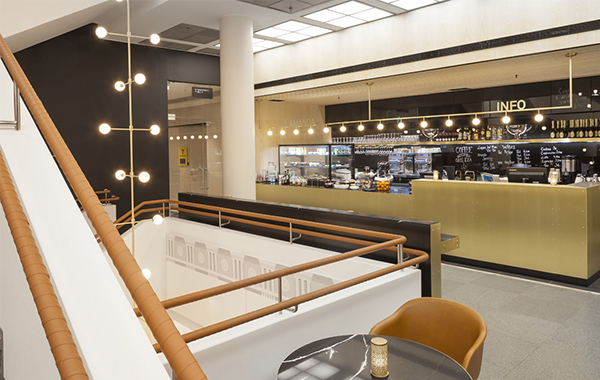
阿曼达办公楼
Amanda office building, Etelä-Esplanadi 8
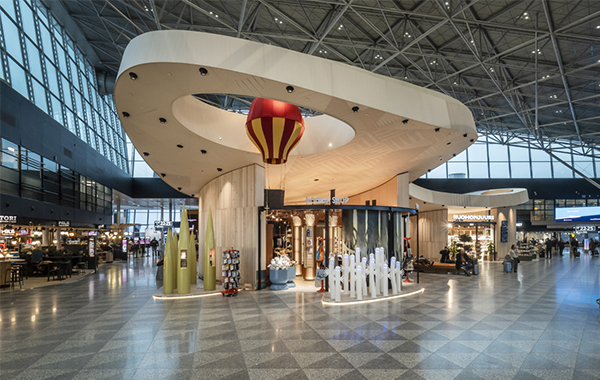
"金色蕈伞"芬兰万塔机场T2航站楼零售单元
Chanterelle - Retail Unit at T2 of Helsinki Vantaa Airport
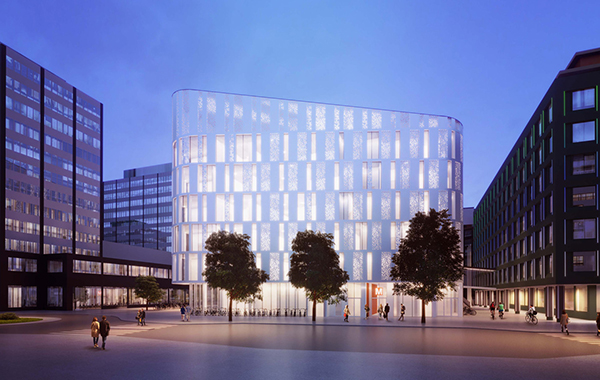
Kamppi康健中心
Kamppi Health and Well-being Centre
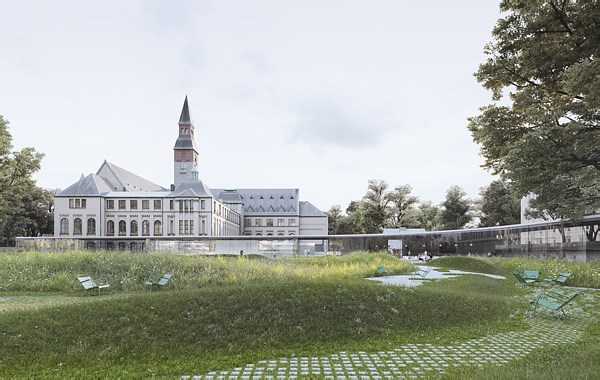
芬兰国家博物馆扩建建筑 (三庭院)
The National Museum of Finland Extension (Uusi Kansallinen)

赫尔辛基花园冰球馆及多功能综合体
Helsinki Garden

西港2号码头
West Terminal 2
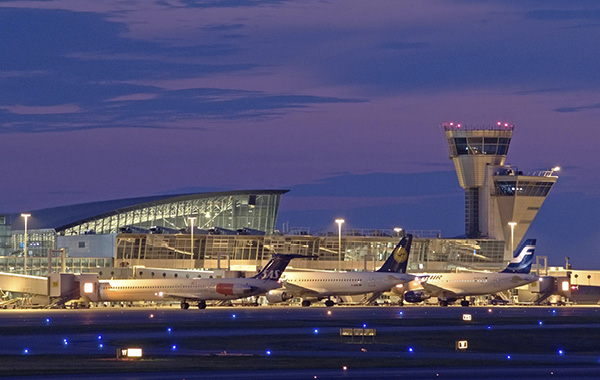
赫尔辛基国际机场
Helsinki Airport
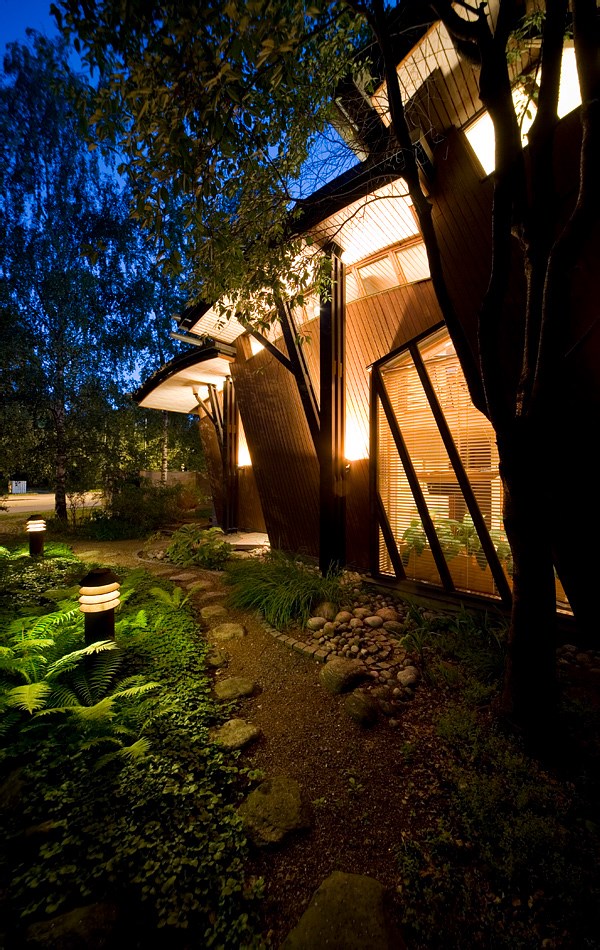
PES芬兰总部办公室
PES Office And Atelier
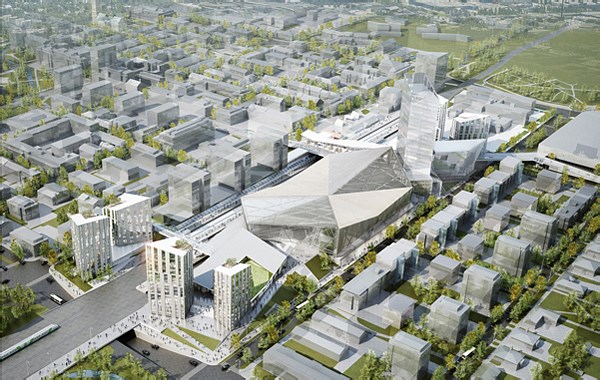
奥卢交通中心及多功能场馆
Oulu Multipurpose Arena

KEHÄRATA环线铁路站点
Helsinki Ring Rail Interior
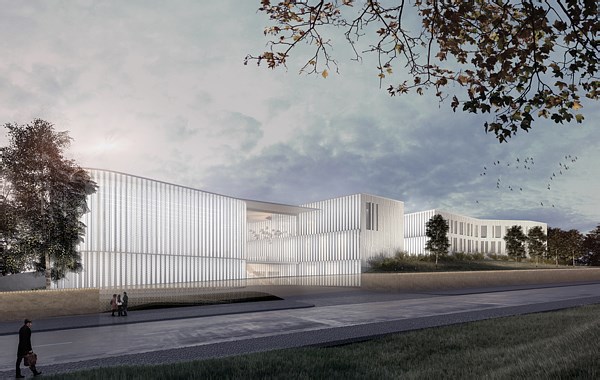
沙特阿拉伯大使馆和员工公寓
Helsinki Saudi Arabia Embassy
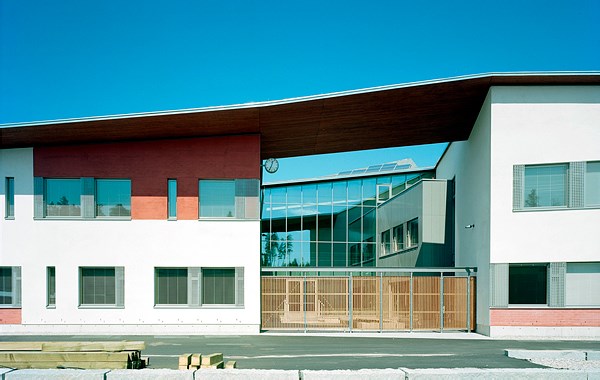
拉托卡塔诺综合学校
Latokartano School
扫描二维码分享到微信